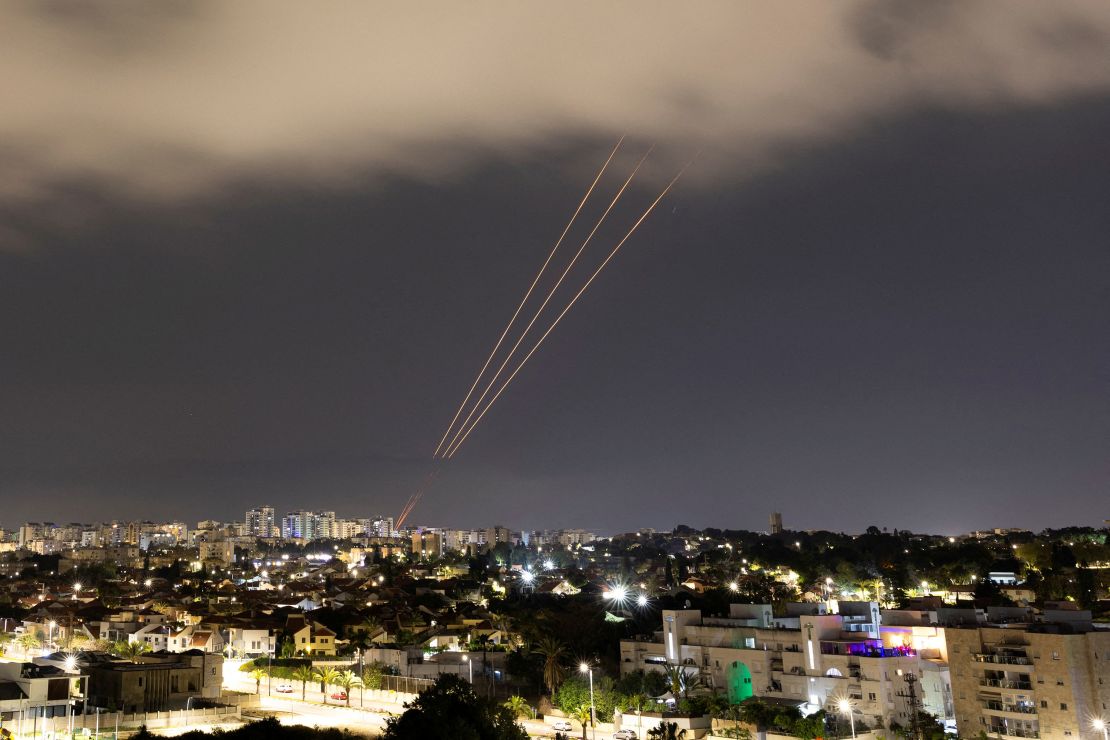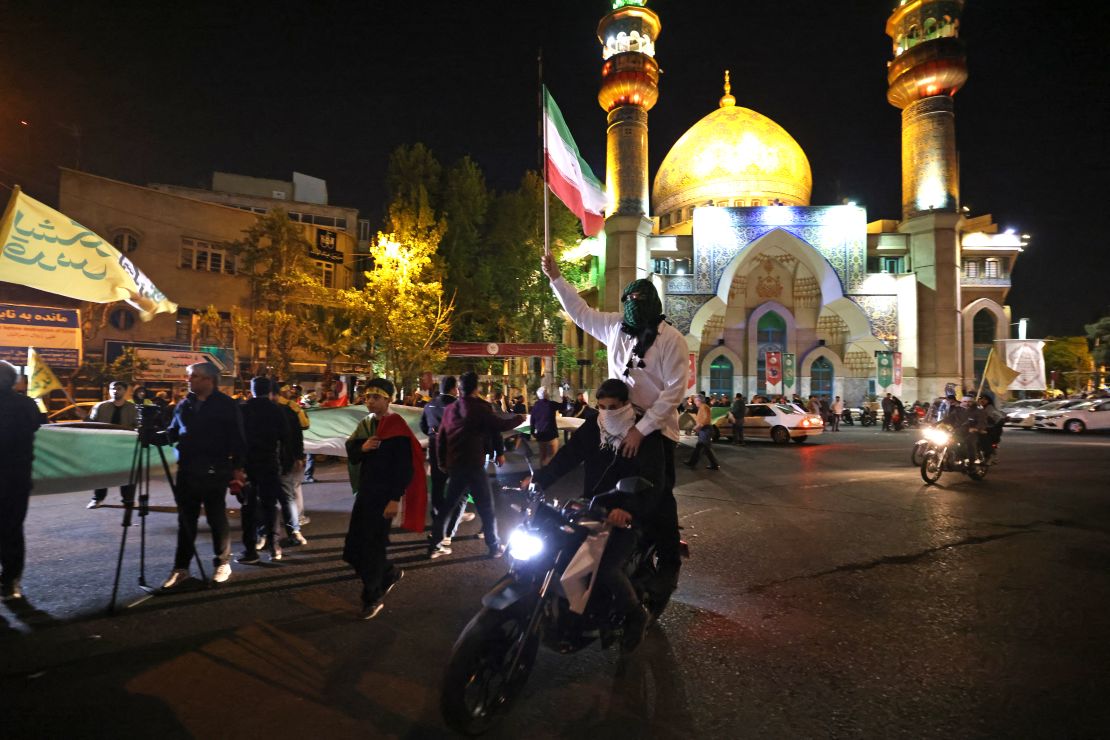- Joined
- Jan 25, 2024
- Messages
- 111,139
- Nation

[H3]Iran's attack seemed planned to minimize casualties while maximizing spectacle[/H3]
Analysis by Tamara Qiblawi, CNN
Sun April 14, 2024
A decades-long shadow war burst out into the open overnight as Iranian drones and missiles lit up the night sky in Israel and the occupied West Bank. Tehran's operation was highly choreographed, apparently designed to minimize casualties while maximizing spectacle.
This was a complex mission. Over 300 drones and missiles navigated above Iran's neighbors, including Jordan and Iraq — both with US military bases — before penetrating the airspace of Iran's mortal enemy, Israel. Israel's allies helped shoot down the bulk of these weapons, but couldn't prevent what was long believed to be the Middle East's doomsday scenario, the Islamic Republic's first-ever attack on Israel.
Israel's fabled Iron Dome air defense system did not disappoint Israelis, many of whom took to bunkers. Only a small handful of locations were attacked, including a military base and an area in the Negev desert, injuring a Bedouin child, while the dome fended off one of the largest drone attacks in history
Yet it was an operation that seemed designed to fail — when Iran launched its killer drones from its own territory some 1,000 miles away, it was giving Israel hours of advance notice.
The symbolism of the attack did the heavy lifting. Rather than fire from one of the neighboring countries where Iran and its non-state allies are present, this was a direct attack from Iranian territory on Israeli territory. This compromised Iran's ability to damage Israel because it robbed the operation of the element of surprise.
Yet for some four hours, the world held its breath as weapons whizzed through the night sky. They were balls of fire hovering overhead as onlookers across three different countries filmed images that seemed to harken the start of a cataclysmic war.

An anti-missile system operates after Iran launched drones and missiles towards Israel, as seen from Ashkelon, Israel.
Amir Cohen/Reuters
The lead time meant that Israel and its regional partners could ready Israel's defenses, and the operation amounted to little more than a terrifying fireworks display. When Iran's permanent mission at the United Nations tweeted that the operation had "concluded," it was easy to come away from it thinking the Islamic Republic was all bark and no bite.
The strike served as a retaliation against the Israeli airstrikes on Iran's consulate in Damascus earlier in April that killed a top commander, and it was in keeping with US intelligence and analysts' expectations.
Iran's leadership felt compelled to strike Israel in order to reiterate its position as a regional powerhouse and to dispel notions of it as a paper tiger. It doubled down on its show of force by launching the operation from its own territory and not by proxy in Syria, Lebanon, Yemen or Iraq.
Yet Iran also needed to try to avoid sparking an all-out war. Its economy has buckled under the weight of Trump-era sanctions, and there is growing discontent on its streets over the government's repressive policies. On Sunday, Iran appeared not only to have factored in Israel's robust air defense systems, but to have relied on it.
The relatively high degree of US intelligence about the operation also suggests Iran may have engaged in back-channelling with Western leaders. Iranian Foreign Minister Hossein Amir Abdollahian said he gave neighboring countries, including major US allies, 72-hour notice. To contain the fall-out of their own operation, they appeared intent to foil it.
The style of attack is reminiscent of Tehran's response to former President Donald Trump's targeted killing of Iran's most storied general, Qassem Soleimani, in January 2020. Tehran gave US troops 10 hours of advance warning before raining down massive ballistic missiles on US military positions in Iraq, including al-Asad airbase.
The attack wreaked havoc, leaving gaping craters in the ground, but caused no known US casualties. In the process, Iranian forces accidentally shot down a commercial jet taking off from Tehran airport, killing over 100 passengers and fuelling public anger against a regime increasingly seen as incompetent.
At the time, the Iranians were preoccupied with demonstrating what their military could do, rather than what it was willing to do. The US did not retaliate, averting regional war.
Four years later, Iran's playbook may not unfold in the same way. Israel has already vowed to respond. The US has publicly stated it would not participate in an Israeli retaliation, which may reassure Iran. Yet Netanyahu's Israel has proven increasingly unpredictable. Iran's threats of more severe action in case of further escalation may fall on deaf ears in Israel, to its own peril.

Demonstrators wave Iran's flag as they gather at Palestine Square in Tehran on April 14, 2024, after Iran launched a drone and missile attack on Israel.
Atta Kenare/AFP/Getty Images
In a future Iran strike, Tehran may not hesitate to use Israel's northern border as a launching pad. A week before the attack, one Lebanese source familiar with the matter had ruled out that Hezbollah, Iran's most powerful armed group partner, would be part of Iran's initial retaliation to the April 1 consulate strike.
However, the source warned that Hezbollah and other Iran-backed fighting forces "will be prepared for the stage that comes after the Iranian response."
A forceful Israeli retaliation may push Iran to take on an even more hardline position beyond its Israel policy. Conservatives have consolidated control of Iran's government in recent years, and there is growing resistance to Western pressure to curb the country's feared uranium enrichment program.
"There must be some satisfaction in certain circles in DC and Israel that Iran's limited response reflects the imbalance of power in Israel's favor," wrote Trita Parsi, DC-based Iran analyst and Executive Vice President of the Quincy Institute, on X.
"But think further and you'll realise how this episode will strengthen those in Tehran who believe Iran must go nuclear."
Analysis by Tamara Qiblawi, CNN
Sun April 14, 2024
A decades-long shadow war burst out into the open overnight as Iranian drones and missiles lit up the night sky in Israel and the occupied West Bank. Tehran's operation was highly choreographed, apparently designed to minimize casualties while maximizing spectacle.
This was a complex mission. Over 300 drones and missiles navigated above Iran's neighbors, including Jordan and Iraq — both with US military bases — before penetrating the airspace of Iran's mortal enemy, Israel. Israel's allies helped shoot down the bulk of these weapons, but couldn't prevent what was long believed to be the Middle East's doomsday scenario, the Islamic Republic's first-ever attack on Israel.
Israel's fabled Iron Dome air defense system did not disappoint Israelis, many of whom took to bunkers. Only a small handful of locations were attacked, including a military base and an area in the Negev desert, injuring a Bedouin child, while the dome fended off one of the largest drone attacks in history
Yet it was an operation that seemed designed to fail — when Iran launched its killer drones from its own territory some 1,000 miles away, it was giving Israel hours of advance notice.
The symbolism of the attack did the heavy lifting. Rather than fire from one of the neighboring countries where Iran and its non-state allies are present, this was a direct attack from Iranian territory on Israeli territory. This compromised Iran's ability to damage Israel because it robbed the operation of the element of surprise.
Yet for some four hours, the world held its breath as weapons whizzed through the night sky. They were balls of fire hovering overhead as onlookers across three different countries filmed images that seemed to harken the start of a cataclysmic war.

An anti-missile system operates after Iran launched drones and missiles towards Israel, as seen from Ashkelon, Israel.
Amir Cohen/Reuters
The lead time meant that Israel and its regional partners could ready Israel's defenses, and the operation amounted to little more than a terrifying fireworks display. When Iran's permanent mission at the United Nations tweeted that the operation had "concluded," it was easy to come away from it thinking the Islamic Republic was all bark and no bite.
The strike served as a retaliation against the Israeli airstrikes on Iran's consulate in Damascus earlier in April that killed a top commander, and it was in keeping with US intelligence and analysts' expectations.
Iran's leadership felt compelled to strike Israel in order to reiterate its position as a regional powerhouse and to dispel notions of it as a paper tiger. It doubled down on its show of force by launching the operation from its own territory and not by proxy in Syria, Lebanon, Yemen or Iraq.
Yet Iran also needed to try to avoid sparking an all-out war. Its economy has buckled under the weight of Trump-era sanctions, and there is growing discontent on its streets over the government's repressive policies. On Sunday, Iran appeared not only to have factored in Israel's robust air defense systems, but to have relied on it.
The relatively high degree of US intelligence about the operation also suggests Iran may have engaged in back-channelling with Western leaders. Iranian Foreign Minister Hossein Amir Abdollahian said he gave neighboring countries, including major US allies, 72-hour notice. To contain the fall-out of their own operation, they appeared intent to foil it.
The style of attack is reminiscent of Tehran's response to former President Donald Trump's targeted killing of Iran's most storied general, Qassem Soleimani, in January 2020. Tehran gave US troops 10 hours of advance warning before raining down massive ballistic missiles on US military positions in Iraq, including al-Asad airbase.
The attack wreaked havoc, leaving gaping craters in the ground, but caused no known US casualties. In the process, Iranian forces accidentally shot down a commercial jet taking off from Tehran airport, killing over 100 passengers and fuelling public anger against a regime increasingly seen as incompetent.
At the time, the Iranians were preoccupied with demonstrating what their military could do, rather than what it was willing to do. The US did not retaliate, averting regional war.
Four years later, Iran's playbook may not unfold in the same way. Israel has already vowed to respond. The US has publicly stated it would not participate in an Israeli retaliation, which may reassure Iran. Yet Netanyahu's Israel has proven increasingly unpredictable. Iran's threats of more severe action in case of further escalation may fall on deaf ears in Israel, to its own peril.

Demonstrators wave Iran's flag as they gather at Palestine Square in Tehran on April 14, 2024, after Iran launched a drone and missile attack on Israel.
Atta Kenare/AFP/Getty Images
In a future Iran strike, Tehran may not hesitate to use Israel's northern border as a launching pad. A week before the attack, one Lebanese source familiar with the matter had ruled out that Hezbollah, Iran's most powerful armed group partner, would be part of Iran's initial retaliation to the April 1 consulate strike.
However, the source warned that Hezbollah and other Iran-backed fighting forces "will be prepared for the stage that comes after the Iranian response."
A forceful Israeli retaliation may push Iran to take on an even more hardline position beyond its Israel policy. Conservatives have consolidated control of Iran's government in recent years, and there is growing resistance to Western pressure to curb the country's feared uranium enrichment program.
"There must be some satisfaction in certain circles in DC and Israel that Iran's limited response reflects the imbalance of power in Israel's favor," wrote Trita Parsi, DC-based Iran analyst and Executive Vice President of the Quincy Institute, on X.
"But think further and you'll realise how this episode will strengthen those in Tehran who believe Iran must go nuclear."







































